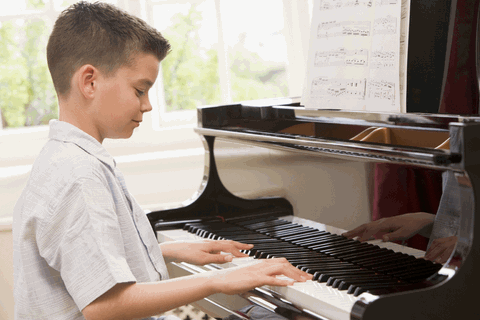 Research from all over the world, including institutions such as the University of Toronto and the University of Wisconsin, show that taking piano lessons helps us in many ways that reach far beyond simply being able to play a song. Music teachers help people of all ages develop skills that are helpful in many areas of life, and those skills show up after just a few months of piano lessons. Here are several ways that attending a piano school or learning other instruments can make a difference in other areas of life.
Research from all over the world, including institutions such as the University of Toronto and the University of Wisconsin, show that taking piano lessons helps us in many ways that reach far beyond simply being able to play a song. Music teachers help people of all ages develop skills that are helpful in many areas of life, and those skills show up after just a few months of piano lessons. Here are several ways that attending a piano school or learning other instruments can make a difference in other areas of life.
Development of Fine Motor Skills
Almost all instruments require practiced dexterity in the fingers and in hand movements. In instruments like the piano and guitar, each hand moves as an individual, a very complex skill. Learning an instrument that promotes dual hand work helps people pick up practices that require fine motor skills and good hand-eye coordination such as touch typing even when begun later in life. Some instruments such as the piano and drums also require foot movements that are in a different rhythm than the hands, and all students who learn to read music when studying these instruments develop superior hand-eye coordination.
Improved Brain Function
Music lessons improve cognition, the process that learns to transform sensory information into practical information and stores it in the brain. Northwestern University studies (2) proved that just
a few years of childhood music studies produced long-lasting effects on memory and perception skills. The positive effects of music instruction didn’t stop with children, however. Although slightly reduced, even adults who began music lessons experienced an increase in neurological responses when compared to those who did not.
Improved Learning Capacity
When teachers use strong, positive reinforcement during music instructions, they develop a stronger sense of self-esteem in young children. Learning to play the piano or other instruments also teaches young people a sense of accomplishment right from the start. Having good self-image and understanding how hard work pays off through improved success in school and future careers.
The self-perception and self-image applications of music lessons in young people’s lives are not the only valuable aspects that music teachers pass on to students. Piano students learn the use of fractions and other complex concepts such as ratios quicker than non-music students. That is due to the fact that these concepts are used all throughout printed music, and students must master them to get the most out of their piano studies.
Improved Concentration
Learning a multi-faceted instrument such as the piano requires full concentration. Attention to both hands, feet and the written music in front of a student means the mind must learn to make quick computations and translate them accurately. Playing an instrument is as much a critical thinking skill as it is an art form.
Improved Appreciation for all Genres of Music
Children who never study an instrument tend to listen only to the music played by their peers. The music that is popular in any given group of youngsters varies depending on location, age and even culture, but taking music lessons broadens that appreciation by exposing children to a vast body of music in all genres. Music teachers encourage students to study many different genres, and the piano is a very diverse instrument and shows up in all types of music including classical, jazz, country, blues, folk and rock.
Improved Memory Capacity
Another area of brain function that learning the piano improves is memory. Teachers often encourage a student to learn passages of various pieces, and students themselves tend to begin memorizing favorite parts. Memory function is developed early in the student’s music career, as soon as they begin to learn how to read sheet music and increases as they develop their musical skills.
Improved Social Skills
Music lessons increase social behaviors as the student, regardless of age must learn how to communicate with their teacher. As the student develops and becomes part of a larger group playing in bands or other ensembles, they have to learn how to work in a group. This practice also helps them appreciate the value of working together to create a successful performance.
Improved Discipline
Learning music teaches patience. It takes time to develop the dexterity and hand eye coordination required to play properly. It takes time to understand music notations. The time it takes to advance at every level of instruction helps pupils learn to accept delayed gratification in exchange for the benefits.
The Extended Benefits of Taking Piano Lessons
 Research from all over the world, including institutions such as the University of Toronto and the University of Wisconsin, show that taking piano lessons helps us in many ways that reach far beyond simply being able to play a song. Music teachers help people of all ages develop skills that are helpful in many areas of life, and those skills show up after just a few months of piano lessons. Here are several ways that attending a piano school or learning other instruments can make a difference in other areas of life.
Research from all over the world, including institutions such as the University of Toronto and the University of Wisconsin, show that taking piano lessons helps us in many ways that reach far beyond simply being able to play a song. Music teachers help people of all ages develop skills that are helpful in many areas of life, and those skills show up after just a few months of piano lessons. Here are several ways that attending a piano school or learning other instruments can make a difference in other areas of life.


